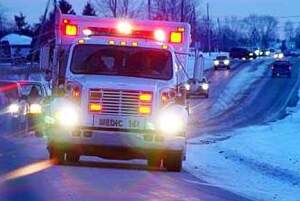by
Brendon Nafziger, DOTmed News Associate Editor | December 14, 2010
Is the radiation dose from two or three abdominal CT scans the same as received by survivors of the atom bomb dropped on Hiroshima?
If you answered no, you're wrong, scientists say, but it turns out you're far from alone.
A new study suggests patients showing up to the emergency room with abdominal pain feel more confident in a doctor's exam if they receive a CT scan, but most underestimate the risks of the scan and a good number even forget having had a scan in the past.



Ad Statistics
Times Displayed: 137680
Times Visited: 7952 MIT labs, experts in Multi-Vendor component level repair of: MRI Coils, RF amplifiers, Gradient Amplifiers Contrast Media Injectors. System repairs, sub-assembly repairs, component level repairs, refurbish/calibrate. info@mitlabsusa.com/+1 (305) 470-8013
In the study published online this week in the Annals of Emergency Medicine, researchers found patients at a New Jersey city hospital were four and a half times more confident in a doctor's evaluation if it included blood work and a CT scan. But nearly 70 percent of patients underestimated the radiation delivered by CT imaging when compared with chest X-rays.
CT scan use has grown dramatically, from around 2 million scans in 1980 to nearly 72 million in 2007, the researchers said. CT scans now account for the bulk in the rise of the public's exposure to medical radiation, with some scientists arguing over the next few decades the scans will be responsible for causing thousands of new cancers.
But many patients appear to be unaware of risks associated with CT imaging, according to Dr. Brigitte M. Baumann, a professor of emergency medicine at Cooper University Hospital in Camden, N.J. She and her colleagues polled 1,168 patients in the ER to assess their grasp of CT risks and see how confident they were in physician evaluations.
Patients seemed to find evaluations more trustworthy if they included tests. A physical exam and history only got a median 20 (out of 100) confidence score. Adding blood work brought the score to a median 84 confidence score. With CT scans, the score reached the highest levels, a median 90.
But patients were not terribly accurate about the risks of getting the CT scans, the researchers said. Nearly half (45 percent) of patients thought abdominal CT scans gave the same radiation dose as a pair of chest X-rays, and at least 50 patients thought it delivered less radiation.
In reality, a chest X-ray gives 0.1 mSv, the equivalent of 10 days exposure to naturally occurring background radiation, according to the Radiological Society of North America. Depending on configurations, a CT scan of the abdomen can give 15 mSv -- equal to nearly five years the background rate.
The majority of patients also didn't think receiving a couple of abdominal CT scans exposed them to the same levels of radiation received by many survivors of the Hiroshima atomic bomb, and that it didn't raise lifetime cancer risks. But both of these claims are "true and well supported by the literature," Baumann and colleagues wrote.
And in a puzzling finding, many patients didn't remember having received a CT scan in the past. By checking accounts from patients with their medical records, Baumann found of the 365 patients who said they had never had a scan, 39 percent had actually had one.
Still, the authors note the results come from an urban hospital where a quarter of the patients were poor and on Medicaid, and they warn against generalizing to suburban hospitals or other settings. But they suggest efforts at dose awareness will fail unless backed by broader educational outreach.
"Increased awareness cannot translate to increased health literacy if patients do not understand what their exposures mean," they wrote.

